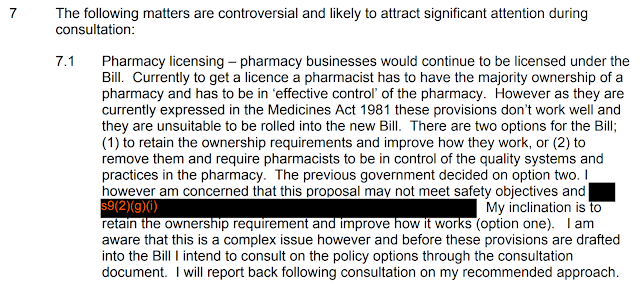The Herald reports that a new entrant has finally started shaking things up in pharmacy, reducing costs to consumers. They get the framing entirely backwards, focusing on reduced earnings among the Chemist Warehouse's nearby competitors.
I wish they'd open an outlet in Wellington so I could have a look. Here's a dumb small example of what things are like here. I occasionally have minor heartburn. In North America, I'd buy a big bottle of Tums antacid. It'd take me a year to go through the big bottle. Now they sell them there in even bigger bottles: 330 tablets for $13.44 - $0.04 per tablet. Add on exchange rates and GST and you're still under $0.07 per tablet. The things are also great as placebo when a child is malingering.
Here's what you can buy in New Zealand. The cheapest per-unit is a tiny little pack of Quick-Eze. They taste rubbish. And they're $0.15 per tablet.
Every single thing in NZ pharmacies feels like a giant rip-off. My wife and son are lactose intolerant. Here's what lactase should cost: 9 cents US per tablet (9000 lactase units per tablet) - about 15 cents NZD with GST. Here's what it does cost: 76.5 cents per tablet - five times what it should cost. If you need a couple of these things to eat an ice-cream cone, New Zealand adds about 40% to the cost of an ice cream cone for the lactose intolerant - at least for those who haven't worked out ways of getting them imported.
It would have been nice if the reporter at the Herald had compared prices at the new discount pharmacy warehouse; I'm curious.
Anyway, why has it been so hard to get decent prices on anything pharmacy in New Zealand? The government screwed up the whole industry, forcing everyone to pay too much for everything, by putting in a rule saying that every pharmacy must be 51% owned by a pharmacist. I don't know how Chemist Warehouse has solved this problem: it's not easy to find one person, who happens to be a chemist, who has the capital to put up to build something like that. Maybe there are interesting ways around it with a clever debt structure.
The prior National government was looking to get rid of the rule in changes to the Therapeutic Products Regulatory Regime. The pharmacists didn't like it.
The Bill as currently drafted, and currently under consultation, seems to leave the ownership question open. Or at least I can't find any requirement in it that pharmacies be owned by pharmacists, but I can find a requirement that the responsible persons for the licence have qualifications as determined by the rules - with the rules not specified. I think that's because Minister Clark has left it open. But he does provide some discussion in December's background paper:
The pharmacists' organisation raised a pile of concerns about market concentration in the absence of the rule, but remember that the point of competition law is to improve outcomes for consumers, not to prevent concentration per se. The current model delivers terrible prices for New Zealand consumers - and especially for those consumers least able to route around the current mess by importing the products they need.
There is absolutely no good reason to require that the person owning a pharmacy be a pharmacist. There are good reasons to require that dispensing be done by a pharmacist.
The government is taking submissions through 18 April. If you think submitting makes any difference, here's the link.
That the criminalisation provisions in current New Zealand competition policy do not apply to regulators who create cartels continues to frustrate me. New Zealand has a lot of small-market problems that make things a bit less competitive automatically. But everywhere people think they see cartels or anticompetitive activity - dig a little to find the regulatory apparatus blocking competitors' entry.





No comments:
Post a Comment